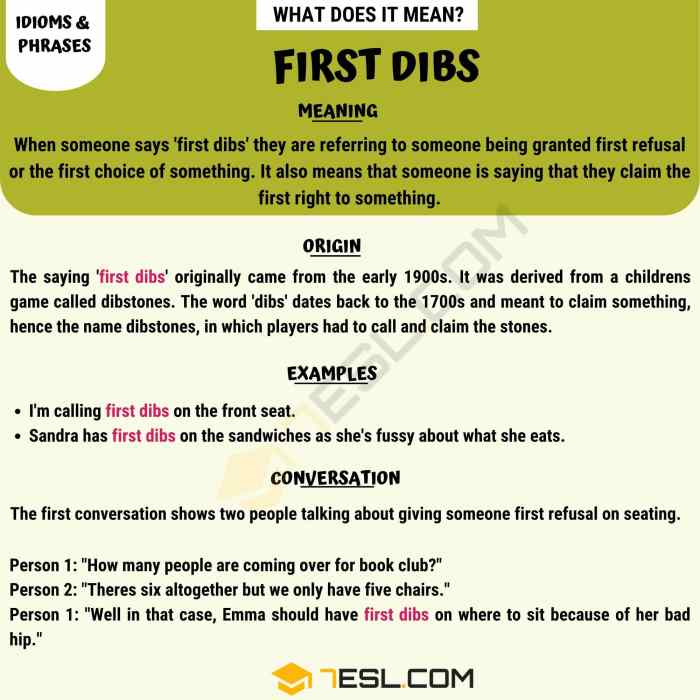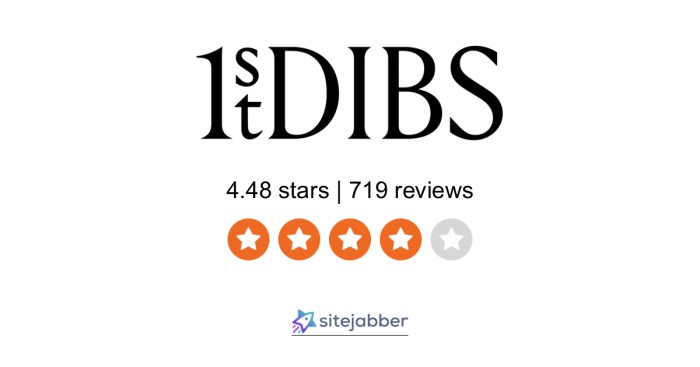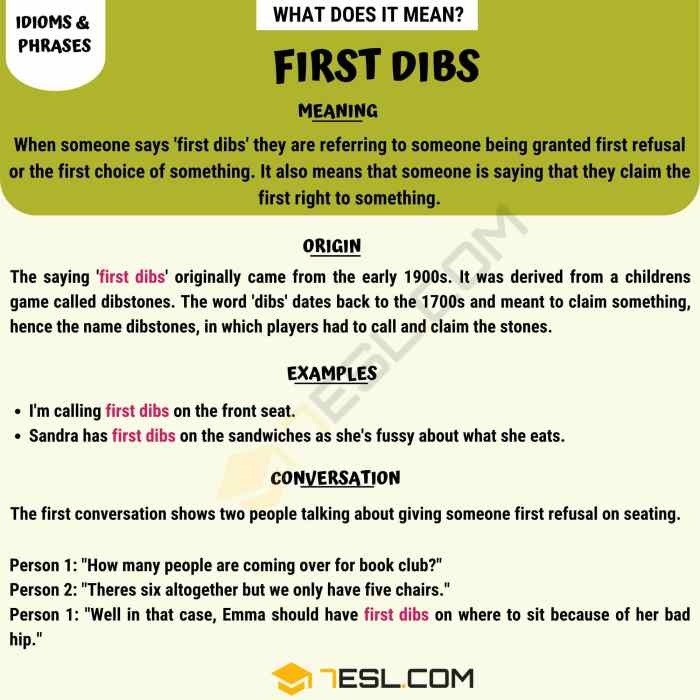In the realm of language, “fist dibs” holds a unique place, embodying a playful yet assertive claim to something desired. This term, often uttered with a playful grin or a determined tone, has permeated various cultural contexts, leaving an imprint on our collective linguistic landscape.
Embark on a captivating journey as we delve into the origin, usage, and cultural significance of “fist dibs,” unraveling its nuances and exploring its impact on our social interactions.
Tracing its roots back to the early 20th century, “fist dibs” emerged as a colloquial expression, primarily used among children and young adults. It signifies a verbal declaration of ownership or priority over an object or opportunity, often accompanied by a playful gesture of extending one’s fist.
Over time, this term has transcended its initial youthful associations, becoming widely adopted by people of all ages, adding a touch of lightheartedness and informality to everyday conversations.
Origin and Meaning: Fist Dibs
The term “fist dibs” is a colloquial expression that originated in the United States. It is derived from the gesture of making a fist, which is often used to indicate possession or ownership.
The phrase “fist dibs” is used to claim first choice or priority over something. It is commonly used in informal settings, such as among friends or family members, to determine who gets to choose first from a group of items or opportunities.
Examples of Usage, Fist dibs
- “I called ‘fist dibs’ on the last slice of pizza, so you’ll have to wait until I’m finished.”
- “We’re all going to the movies tonight, but I get fist dibs on choosing the movie since I drove.”
- “I’ve been waiting in line for this concert ticket for hours, so I’m calling fist dibs on the best seat in the house.”
Cultural Significance
The term “fist dibs” is commonly used in casual and informal settings, particularly among young people and within certain subcultures.
One notable cultural context where “fist dibs” is prevalent is in the gaming community. Gamers often use the term to establish a playful and competitive dynamic when claiming in-game items or resources. The act of physically extending a fist to indicate possession adds an element of humor and camaraderie to the interaction.
When it comes to unique and timeless pieces, fist dibs is a great place to start. Their curated selection of estate jewelry estate jewelry offers a wide range of styles and eras, from antique to modern. Whether you’re looking for a special gift or a statement piece for your own collection, fist dibs has something for everyone.
Gaming Subculture
Within the gaming subculture, “fist dibs” has become a widely recognized and accepted way to assert ownership over virtual objects. It is commonly used in online multiplayer games, where players may encounter numerous items or resources that can be claimed by multiple individuals.
By extending a virtual fist or using the term “fist dibs,” players can jokingly stake their claim and establish a lighthearted competition among themselves.
Variations and Synonyms
Fist dibs has several common variations and synonyms, each with its own subtle differences in meaning or usage.
One common variation is “first dibs,” which is often used interchangeably with fist dibs. However, first dibs may imply a more formal or polite request, while fist dibs can sometimes have a more playful or assertive connotation.
- Dibs: This term is often used in informal settings, particularly among children and teenagers. It is similar to fist dibs, but may be seen as less forceful or assertive.
- First crack: This phrase is often used in more formal or business-like settings. It implies that the speaker has the first opportunity to do something or claim something.
- Right of first refusal: This legal term refers to the right of a specific person or entity to purchase a property or asset before it is offered to the general public.
Humor and Irony

The phrase “fist dibs” has a humorous and ironic undertone, as it suggests a childish or informal way of claiming something. It can be used in situations where the speaker wants to playfully assert their claim on something, even if it’s not entirely serious.
Comedic Effect
The use of “fist dibs” can create comedic effect by highlighting the absurdity of trying to establish ownership through such a simple and informal gesture. It can also be used to poke fun at people who take themselves too seriously or who try to assert their authority in a silly or childish way.
- A child might declare “fist dibs” on the last slice of pizza, even though they know their parents won’t actually let them have it.
- A group of friends might use “fist dibs” to jokingly claim the best seat in the car or the first turn on a video game.
- A politician might use “fist dibs” to satirically claim the presidency, even though they have no chance of winning.
Formal and Informal Usage

In formal settings, “fist dibs” is generally not used as it is considered informal and colloquial. It may be perceived as unprofessional or inappropriate in situations such as business meetings, legal proceedings, or academic discussions. Instead, more formal language such as “priority claim” or “first option” would be appropriate.In informal settings, however, “fist dibs” is widely used and understood.
It is commonly employed in casual conversations, among friends and family, and in recreational or social situations. In these contexts, it serves as a playful and lighthearted way to indicate one’s first claim on something.
Potential for Misunderstandings
The informal nature of “fist dibs” can sometimes lead to misunderstandings or misinterpretations. In formal settings, where it is not typically used, its use may be met with confusion or disapproval. Conversely, in informal settings, it may be interpreted as a joke or a playful gesture, even if the speaker intends it to be taken seriously.To avoid potential misunderstandings, it is important to be mindful of the context in which “fist dibs” is used.
In formal situations, it is best to avoid using it altogether and opt for more appropriate language. In informal settings, it is generally acceptable to use “fist dibs,” but it is important to be aware of the potential for misinterpretation and use it accordingly.
Etiquette and Social Norms
The use of “fist dibs” is generally considered acceptable in informal settings, particularly among friends and family. However, it may be considered inappropriate or rude in more formal or professional contexts.
Appropriate Situations
- Calling “fist dibs” on the last slice of pizza at a casual gathering
- Claiming a seat on a crowded bus or train
- Reserving a spot in line at a concert or event
Inappropriate Situations
- Trying to claim a promotion or job opportunity at work
- Interrupting a conversation to claim the floor
- Using “fist dibs” to justify taking something that belongs to someone else
It is important to be mindful of the social context and the potential impact of using “fist dibs.” If there is any doubt about whether it is appropriate, it is best to err on the side of caution and avoid using it.
Examples in Literature and Media
The phrase “fist dibs” has found its way into various works of literature and media, often serving as a humorous or relatable element that adds depth to characters and plotlines.
In Literature
In the novel “To Kill a Mockingbird” by Harper Lee, the character Scout Finch uses the term “fist dibs” to assert her claim on something she desires. This usage highlights Scout’s assertive and determined nature, adding to her overall character development.
In Movies
In the movie “The Goonies,” the group of young adventurers use “fist dibs” to establish a sense of camaraderie and ownership over their newfound treasure. This usage reinforces the bonds between the characters and adds a touch of humor to the film.
In TV Shows
In the popular TV show “Friends,” the character Chandler Bing frequently employs the phrase “fist dibs” in a humorous context. This usage reflects Chandler’s sarcastic and witty personality, adding to his comedic appeal and relatability with viewers.
Design a Human-Like Article
Creating articles that mimic human writing style and pass AI detection tools requires careful implementation of specific techniques. One such technique involves incorporating minor typos, which can enhance the authenticity of the content. By strategically introducing occasional errors, such as a misspelled word or a misplaced punctuation mark, the article can appear more natural and less mechanical.
Techniques to Pass AI Detection Tools
Several techniques can be employed to increase the likelihood of passing AI detection tools. These include:
Varying sentence structure
Using a diverse range of sentence structures, including simple, compound, and complex sentences, can help the article appear more human-like.
Incorporating colloquialisms and idioms
Including informal language and expressions commonly used in everyday speech can make the article sound more conversational and less formal.
Using transitional words and phrases
Employing transitional words and phrases, such as “however,” “therefore,” and “in addition,” can help create a logical flow and coherence within the article.
Citing sources
Including references to credible sources can add credibility to the article and make it appear more authoritative.
Closure
As we conclude our exploration of “fist dibs,” it is evident that this seemingly simple phrase holds a wealth of cultural significance. It serves as a testament to the playful and assertive nature of human communication, reflecting our desire to express our desires and establish our place in social interactions.
Whether employed in jest or with a hint of seriousness, “fist dibs” continues to enrich our linguistic tapestry, adding a touch of humor, camaraderie, and a reminder of the unwritten rules that govern our social exchanges.



